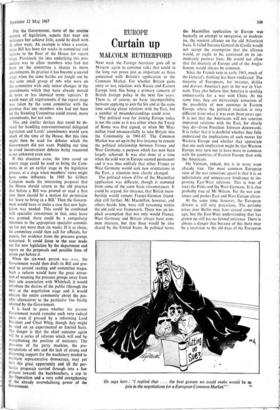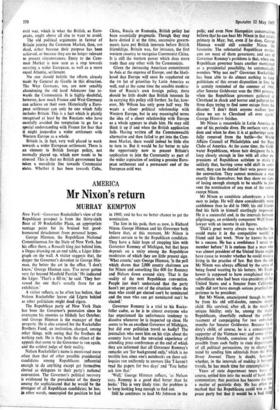Curtain up
EUROPE MALCOLM RUTHERFORD
Next week the Foreign Secretary goes off to Moscow again to continue talks that could in the long run prove just as important as those concerned with Britain's application to the Common Market. For whether. Britain gains entry or not, relations with Russia and Eastern Europe look like being a primary concern of British foreign policy in the next few years. There is, of course, no basic incompatibility between applying to join the Six and at the same time seeking closer relations with the East, but a number of misunderstandings could arise.
The political case for joining Europe today is not the same as it was either when the Treaty of Rome was first signed, or when Mr Mac- millan tried unsuccessfully to take Britain into the Community in 1961-63. The Common Market was set up in the first instance to cement the political relationship between France and West Germany, a purpose which has now been largely achieved. It was also done at a time when the cold war in Europe seemed permanent and it was thus unlikely that either France or West Germany would seek new orientations in the East, a situation now clearly changed.
The political raison d'être of the Macmillan application was different, though it stemmed from some of the same basic circumstances. It could be argued, for instance, that British mem- bership would cement Franco-German friend- ship still further. Mr Macmillan, however, and others beside him, were still reasoning within the old cold war framework. There was an im- plicit assumption that not only would France, West Germany and Britain always have com- mon interests, but that these would be also shared by the United States. In political terms the Macmillan application to Europe was basically an attempt to reorganise, or modern- ise, the western alliance on the old Atlanticist basis. It failed because General de Gaulle would not accept the assumption that the alliance would, or ought to be, continued on its im- mediately postwar lines. He would not allow that the interests of Europe and of the Anglo- Saxons would always be common.
Since the French veto in early 1963, much of the General's thinking has been vindicated. The majority of Europeans, for instance, dislike and distrust America's part in the war in Viet- nam. They also believe that America is spoiling unnecessarily for a war with China. At the same time, they are increasingly conscious of the possibility of new openings in Eastern Europe where the political situation is very different from what it was even three years ago. It is not that the Americans will not sanction improved relations with the East, for clearly they do—from President Johnson downwards. It is rather that it is doubtful whether they fully understand the implications of such moves for Western Europe and whether they appreciate that one such implication might be that Western Europe may turn out to have more in common with the countries of Eastern Europe than with the Americans.
On Vietnam, indeed, this is in many ways already true. The most common European view of the war (emotions apart) is that it is an unfortunate and unnecessary hindrance to im- proving East-West relations. This is true of (say) the Poles and the West Germans. It is also probably true of Mr Wilson. Yet the war con- tinues and pushes East and West Europe closer.
At the same time, however, the European detente is still very precarious. The periodic crises over Berlin may have ceased some time ago, but the East-West understanding that has grown up still has no formal existence. There is always a danger that because of this there may be a reversion to the old days of the European
cold war, which is what the British, as Euro- peans, ought above all else to want to avoid.
The old political arguments in favour of Britain joining the Common Market, then, are dead, either because their purpose has been achieved, or because they are no longer relevant to present circumstances. Entry to the Com- mon Market is now seen as a step towards securing a wider European, as well as a more equal Atlantic, settlement.
No one should belittle the efforts already made by General de Gaulle in this direction. The West Germans, too, are now sensibly abandoning the old hard Adenauer line to- wards the Communists. It is highly doubtful, however, how much France and West Germany can achieve on their own. Historically a Euro- pean settlement can only be one which fully includes Britain. This is a fact which is plainly recognised at least by the Russians who have carefully avoided the temptation to go for a special understanding with France for fear that it might jeopardise a wider settlement with Western Europe as a whole.
Britain is, in fact, very well placed to work towards a wider European settlement. There is an element in British foreign policy, not normally played up, which now needs to be stressed. This is that no British government has taken a moralistic line towards Communist states. Whether it has been towards Cuba,
China, Russia or Rumania, British policy has been essentially pragmatic. Though they may have denied it at the time, successive govern- ments have put British interests before British friendships. Britain was, for instance, the first western country to recognise Communist China. It is still the western power which does more trade than any other with the Communists.
Given the increasing American commitment to Asia at the expense of Europe, and the likeli- hood that Europe will soon be supplanted on the us list of priorities by Latin America as well, and at the same time the sensible modera- tion of Russia's own foreign policy, there should be little doubt that British interests lie in carrying this policy still further. So far, how- ever, Mr Wilson has only gone half way. He wants a closer political relationship with Western Europe, but in any meaningful terms the idea of a closer relationship with Europe as a whole appears to elude him. He may still think it up if and when the British application fails. Having written off the Commonwealth alternative and then failed to get into the Com- mon Market, there would indeed be little else to turn to. But it would be far better to take the opportunity now to present Britain's application to join the Community as part of the wider aspiration of seeking a genuine Euro- pean settlement and a permanent end of the European cold war.































 Previous page
Previous page